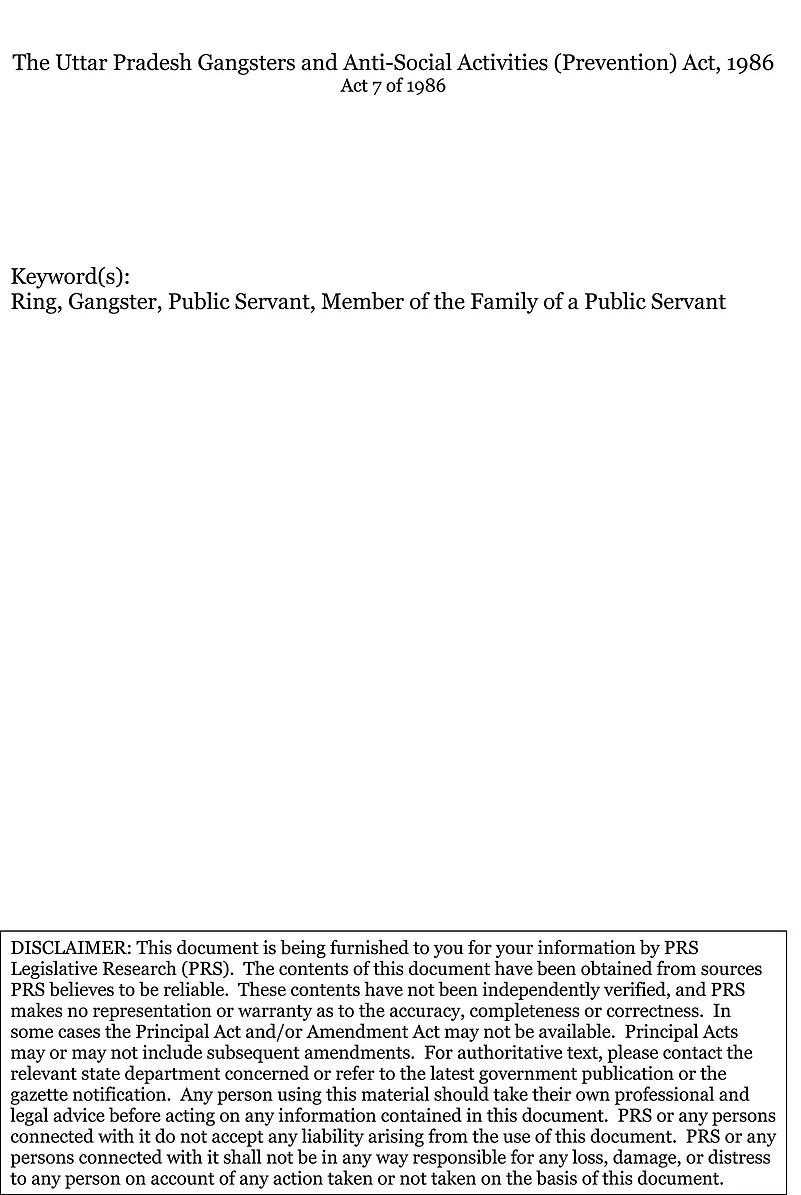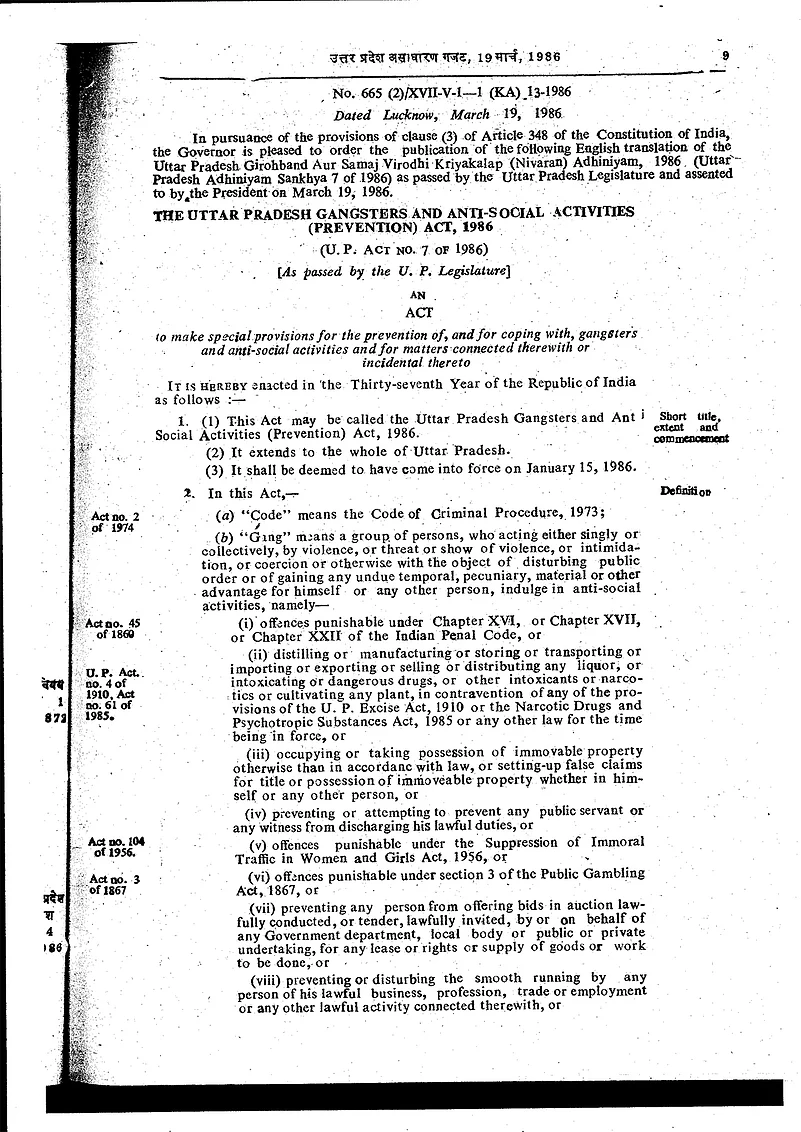In 2021, Kanpur-based Aalia, who faced two criminal cases, approached the Allahabad High Court for bail. In 2020, she had been booked under Section 411 (dishonestly receiving or retaining stolen property) and Section 489 (using as genuine, forged or counterfeit currency-notes or bank-notes) of the Indian Penal Code. However, in addition to this, she was also booked under the stringent Gangsters Act, even though the two criminal cases she faced were unrelated to any gang activity.
While hearing her bail plea, the court made a very striking observation about the functioning of the Uttar Pradesh police.
Vivek Kumar Singh, the Allahabad High Court justice, observed:
“It is very strange that a lady against whom (only) two criminal cases are registered, she is slapped with Gangster Act. This Court has experienced in a number of cases that sometimes the police functionaries act in an eccentric way. Similarly, the present one is an exemplar wherein the act of police functionaries smacks of prejudice and malafide.”
The court directed the district magistrate of Kanpur to explain under what circumstance the woman was booked as a gangster.
This was one of the few occasions when the higher judiciary questioned the UP government’s alleged misuse of the Gangsters Act, the unfettered use of which has been at the heart of the Yogi Adityanath-led Bharatiya Janata Party’s (BJP) policing tactics against what it describes as “mafia criminals” in Uttar Pradesh.
Striking Numbers
The UP Gangsters and Anti-Social Activities (Prevention) Act, 1986 (Gangsters Act) defines a gangster as a member or leader or organiser of a gang and includes any person who abets or assists in the activities of a gang. According to the Act, a gang is a group of persons who act either individually or collectively by violence or threat or show of violence or intimidation or coercion with the object of disturbing order or gaining any undue temporal, pecuniary, material or other advantage for himself or any other person.
The Act allows the administration to designate people as gangsters and seize their property. Section 14 of the contentious Act empowers the district magistrate to attach properties of alleged gangsters.

Former Samajwadi Party (SP) Member of Parliament (MP) Atiq Ahmed, who had a tainted past with numerous criminal cases lodged against him over the years, was one of those who bore the biggest brunt of the Gangsters Act under the Yogi rule. The government demolished and seized property of several hundred crores belonging to the jailed Ahmed under the Gangsters Act before he was killed along with his brother Ashraf in police custody on April 15 in Prayagraj by three assailants with at least two sophisticated pistols in full media view.
Since the BJP came to power in the state in March 2017, police data updated till March 2023 shows, they lodged 20,068 First Information Reports (FIRs) and arrested 64,039 persons under the Gangsters Act.
During the same period, police shot dead at least 183 persons in alleged exchange of fire. The police describe them as ‘encounters’, a definition often contested by human rights activists, who allege these operations are staged killings rather than spontaneous shootouts. Data until mid-March 2023, shows that 4,947 persons sustained injured in these incidents. Since 2017, 13 cops have been killed and 1,428 sustained injured in these operations.
The UP police data also claims that since 2017 they have seized, demolished or freed immovables and movables acquired through illegal means worth a massive Rs 9,162 crore.
Under the Yogi government, this clause has been used without restrain not only against suspected criminals and designated ‘mafia’ but also against Opposition party leaders and MLAs, as well as ordinary citizens.
Most recently, the Yogi administration in Jhansi seized properties worth Rs 130 crore belonging for former SP MLA Deep Narayan Singh under the Gangsters Act.
The government also seized two properties belonging to prominent SP legislator Irfan Solanki of Kanpur in Noida and Ghaziabad under the same law. Solanki was arrested and lodged in jail in a land grab case.


In another recent case, police in Barabanki district seized property worth Rs 4.28 crore belonging to a person identified as Maksud for being a “cow smuggler”. Police alleged he had acquired the property illegally and enforced the Gangsters Act to seize his property.
As per the Gangsters Act, if the District Magistrate has reason to believe that any property, whether moveable or immovable, in possession of any person has been acquired by a gangster as a result of a commission of an offence triable under this Act, he may order attachment of such property whether or not cognizance of such offence has been taken by any court.
‘Misused in Trivial Matters’
Governments have often been accused of slapping the Gangsters Act to settle political scores and suppress opponents. In 2020, a bench of Justice Dinesh Singh of the Allahabad High Court noted that “provisions of the Gangsters Act are being misused thoroughly in the State of UP by the police.”
Justice Singh was hearing a bail application of a Hardoi-resident Kapil Raidas who had been booked under Section 2/3 of the Gangsters Act. The police had recovered some cigarette packets and Rs 6,600 from Raidas and claimed that the amount found on him came from three thefts he had allegedly committed. The investigating officer’s claims did not sit well with the Court.
“This is not a single case where the Court has been confronted with bogus, unbelievable and impossible story set up by the police to implicate one accused in several cases and then invoke the provisions of the Gangsters Act,” Justice Singh said in September 2020.
In November 2020, Justice Singh in another case involving theft charges, noted that the Gangsters Act was being “misused” by the police in “trivial matters” and directed the state DGP to formulate definite guidelines for preventing the misuse of the law.
‘Guidelines Not Being Followed’
The court in January 2021 noted that while guidelines had been issued for preventing the misuse of the provisions of the Gangsters Act by the police in 2014, it appeared that they were not being complied with by authorities.
The state then apprised the court about the recent guidelines issued by it in 2020 following which the judge directed the state DGP to issue a direction that the guidelines be strictly adhered to by the police and in case it was found that the guidelines were violated by any police officer, disciplinary proceeding should be initiated against him or her.
In separate cases in 2021 and 2022, the Allahabad High Court, however, also observed that an FIR under the Gangsters Act could be lodged on the basis of the involvement of an accused in a single previous case.
In July 2021, the UP government filed an affidavit in the High Court justifying invoking the Gangsters Act against a journalist and five others in Maharajganj district.
In December 2022, a lawyer filed a plea in the Supreme Court challenging the constitutional validity of the Gangsters Act alleging that the provisions of the Act were often used arbitrarily by the police.
Despite questions raised by human rights activists and Opposition leaders as well as some judges, Yogi Adityanath’s strong-arm policy against suspected criminals has been widely endorsed by his party’s central leadership, and as election results show, also by the public in UP.
(This appeared in print as The Misused Act)

























